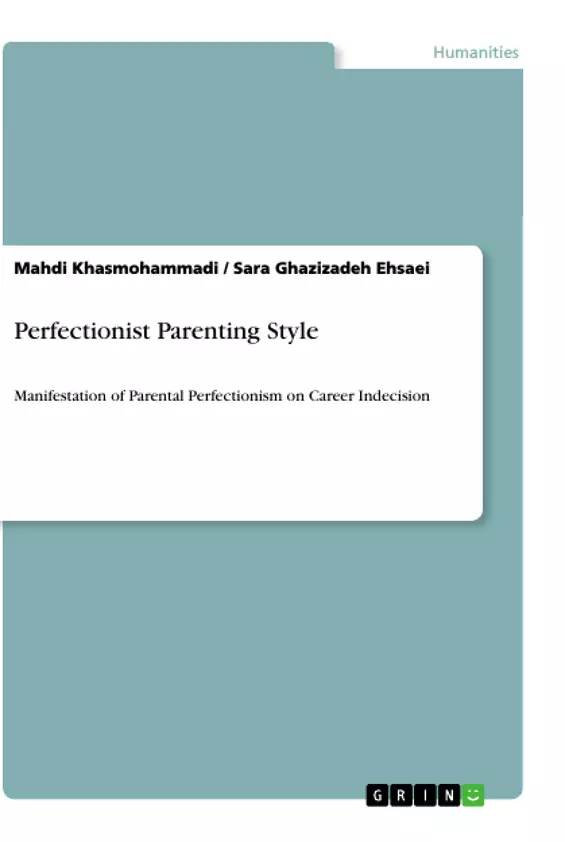This book addresses perfectionist parenting styles contributing to young adults' career indecision. On the intricate influence of parenting styles and parental perfectionism on career indecision, it is written for parents, students, educators, scholars, researchers, and graduate students specializing in the field of psychology and counseling, particularly career and school counseling. Readers can examine the results from studies on young adults' career decision-making difficulties in different contexts. It offers a practical model for parents, clinicians and other professionals seeking to apply this knowledge to real-life settings.
Inhaltsverzeichnis (Table of Contents)
- Preface
- Chapter 1: Introduction
- 1.1: The Nature of Parenting Styles
- 1.2: Parental Perfectionism
- 1.3: Career Indecision
- 1.4: Problem Statement
- 1.5: Objectives of the Study
- 1.6: Research Hypotheses
- 1.7: Significance of the Study
- 1.8: Scope and Limitations of the Study
- 1.9: Definition of Terms
- Chapter 2: Literature Review
- 2.1: Theoretical Framework
- 2.2: Parenting Styles
- 2.2.1: Authoritarian Parenting Style
- 2.2.2: Permissive Parenting Style
- 2.2.3: Authoritative Parenting Style
- 2.2.4: Uninvolved Parenting Style
- 2.3: Parental Perfectionism
- 2.4: Career Development
- 2.5: Career Indecision
- 2.6: The Relationship between Parenting Styles and Career Indecision
- 2.7: The Relationship Between Parental Perfectionism and Career Indecision
- 2.8: Gap in Literature
- Chapter 3: Methodology
- 3.1: Research Design
- 3.2: Participants
- 3.3: Instruments
- 3.4: Data Collection Procedure
- 3.5: Data Analysis
- Chapter 4: Results
- Chapter 5: Discussion
- Chapter 6: Conclusion
Zielsetzung und Themenschwerpunkte (Objectives and Key Themes)
This book aims to investigate the impact of perfectionist parenting on career indecision among young adults. It explores the relationship between parental perfectionism, parenting styles, and young adults' career development, providing insights into the psychological and social factors influencing career choices. The key themes explored in the book are: * **Parenting Styles and their Impact on Career Development:** Examining different parenting styles, their characteristics, and their influence on young adults' career aspirations and decision-making processes. * **Parental Perfectionism and its Relationship to Career Indecision:** Analyzing the role of parental perfectionism in fostering career indecision, exploring the psychological mechanisms involved. * **The Influence of Parental Perfectionism on Young Adults' Career Outcomes:** Investigating the potential long-term effects of perfectionist parenting on career satisfaction, job performance, and overall well-being. * **The Importance of Parental Support and Guidance in Career Development:** Discussing the critical role of parents in providing support and guidance to their children during the career exploration and decision-making phases. * **Strategies for Addressing Career Indecision in Young Adults with Perfectionist Parents:** Providing practical strategies for parents, educators, and counselors to help young adults with perfectionist parents navigate career indecision and achieve fulfilling career paths.Zusammenfassung der Kapitel (Chapter Summaries)
- **Chapter 1: Introduction:** This chapter provides a comprehensive overview of the topic, defining key concepts such as parenting styles, parental perfectionism, and career indecision. It outlines the research problem, objectives, hypotheses, and the significance of the study. The scope and limitations of the study are also discussed, along with the definition of important terms.
- **Chapter 2: Literature Review:** This chapter explores the theoretical framework underpinning the study, reviewing existing research on parenting styles, parental perfectionism, career development, and career indecision. It examines the relationship between these constructs and highlights the gap in existing literature that this study aims to address.
- **Chapter 3: Methodology:** This chapter details the research design, participant characteristics, instruments used to collect data, data collection procedures, and data analysis methods employed in the study.
- **Chapter 4: Results:** This chapter presents the quantitative and qualitative findings of the study, providing insights into the relationship between parental perfectionism, parenting styles, and career indecision among young adults.
- **Chapter 5: Discussion:** This chapter interprets the research findings, discussing the implications of the results for understanding the relationship between parental perfectionism and career indecision. It also explores the theoretical and practical implications of the findings for parents, educators, counselors, and researchers in the field.
Schlüsselwörter (Keywords)
The main keywords and focus topics of this book include parenting styles, parental perfectionism, career development, career indecision, young adults, psychological well-being, and the impact of parenting on career choices. The research focuses on understanding the complexities of the relationship between perfectionist parenting and its influence on career outcomes among young adults, providing valuable insights for parents, educators, and professionals working with adolescents and young adults.Frequently Asked Questions
What is perfectionist parenting?
Perfectionist parenting involves parents setting excessively high standards for their children, often accompanied by overly critical evaluations and a focus on avoiding failure.
How does parental perfectionism lead to career indecision?
Children of perfectionist parents may fear making the "wrong" choice, leading to paralysis and indecision. They often feel that only a "perfect" career path is acceptable to their parents.
What are the different parenting styles mentioned in the book?
The book examines four main styles: Authoritarian (high control, low warmth), Permissive (low control, high warmth), Authoritative (balanced control and warmth), and Uninvolved (low control, low warmth).
Can perfectionist parenting affect long-term well-being?
Yes, research suggests it can lead to higher levels of anxiety, lower job satisfaction, and a constant fear of professional failure in young adults.
How can counselors help students with perfectionist parents?
Counselors can help by encouraging self-compassion, focusing on personal values rather than parental expectations, and using practical decision-making strategies to reduce the pressure of finding a "perfect" career.
- Quote paper
- Dr. Mahdi Khasmohammadi (Author), Dr. Sara Ghazizadeh Ehsaei (Author), 2020, Perfectionist Parenting Style, Munich, GRIN Verlag, https://www.grin.com/document/585291



